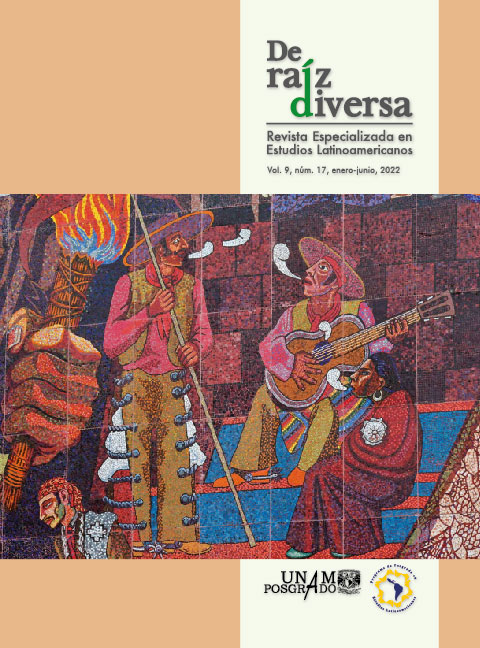The crisis of capital in two contemporary energo-fictions: Temporada de huracanes by Fernanda Melchor and La compañía, by Verónica Gerber Bicecci
Main Article Content
Abstract
This article shows the results of a comparative analysis between two contemporary literary works written by women: Temporada de huracanes (2017) by Fernanda Melchor and La Compañía (2019) by Verónica Gerber Bicecci. We focus on the geospatial transformation of peripheral settlements, the constitution and reaffirmation of masculinity’s prototype, the domain over the body-territory (women’s and Earth’s), and the effacement of certain health conditions provoked by the exposure of a toxic environment as a result of extractivist practices. We sustain the idea that these resources, present in the narrated universes and verified by archives and news media outlets, vouch for the extractivism of raw material for hydrocarbon production in the country. Finally, we establish a dialogue between both texts and some other recent theoretical perspectives in relation to the possibility of creating futures in the crossroad of capitalism and its current cyclical and expansive state.
Downloads
Article Details
Citas en Dimensions Service
References
Bournot, E. (2021). “Abrir las heridas. Gerber, Meruane y Mendieta: geoescrituras de un planeta
enfermo”, en Letral. Revista Electrónica de Estudios Transatlánticos de Literatura, 25, pp.
-73.
Boyer, D. & Szeman, I. (2017). Energy Humanities: An Anthology. Maryland: John Hopkins University
Press.
Bouzaglo, N. Y Guerrero, J. (2009). Excesos del cuerpo, Buenos Aires: Eterna Cadencia.
Connell, R. W. (2005 [1995]). Masculinities. California: University of California Press.
Dagget, C. (2018). “Petro-masculinity: Fossil Fuels and Authoritarian Desire”, en Millenium:
Journal of International Studies, 47, 1, pp. 25-44.
Dávila, A. (2008). Cuentos reunidos. Ciudad de México: Fondo de Cultura Económica.
Deckard, S. (2018). “Gendering Petrofiction: Energy, Imperialism and Social Reproduction”,
en la preimpesión de capítulo por aparecer en Oil Fictions: World Literature and Our
Contemporary Petrosphere, editado por Stacey Balkan y Swaralipi Nandi, https://www.
academia.edu/38327628/Gendering_Petrofiction_Energy_Imperialism_and_Social_
Reproduction
Flys, C., Marrero, J. y Barella, V. (2010). Ecocríticas: Literatura y medio ambiente, Madrid: Iberoamericana-
Vervuert.
Gerber Bicecci, V. (2019). La Compañía. Ciudad de México: Almadía.
(2021). “Poner el lenguaje en las vías (para que estorbe)”, en En una orilla brumosa,
editado por Verónica Gerber Bicecci, Ciudad de México: Gris Tormenta, pp. 13-34.
Ghosh, A. (1992). “Petrofiction”, en The New Republic, 2, pp. 29-33.
Glotfelty, C. (1996). “Introduction: Literary Studies in an Age of Environmental Crisis”, en The
Ecocriticism Reader: Landmarks in Literary Ecology, editado por Cheryll Glotfelty y Harold
Fromm, Georgia: University of Georgia Press, pp. XV-XXXVII.
Guerriero, L. (2005). Los suicidas del fin del mundo. Crónica de un pueblo patagónico. Buenos
Aires: Tusquets.
Haraway, D. (2019). Seguir con el problema: Generar parentesco en el Chthuluceno, Madrid: Consonni.
Keizman, B. (2019). “Territorios y naturaleza bajo la transmutación del archivo”, en Valenciana,
, pp. 229-245.
Macdonald, G. (2012). “Oil and World Literature”, en American Book Review, 33, pp. 3.
Melchor, F. (2017). Temporada de huracanes, Ciudad de México: Literatura Random House.
Montenegro, M. (2019). “Petroafecto: Hacia una lectura de la ubicuidad del petróleo en Pelo
malo de Mariana Rondón”, en Revista de Estudios Hispánicos, 53, pp. 991-1013.
Negrín, E. (2017). Letras sobre un dios mineral. El petróleo mexicano en la narrativa. Ciudad de
México: El Colegio de México / Universidad Nacional Autónoma de México.
Palermo, H. M. (2015). “Machos que se la bancan’: masculinidad y disciplina fabril en la industria
petrolera argentina”, en Desacatos, 47, pp. 100-115.
La producción de la masculinidad en el trabajo petrolero. Buenos Aires: Biblos.
Puleo, A. (2011). Ecofeminismo para otro mundo posible, Madrid: Cátedra.
Rivera Garza, C. (2012). El mal de la taiga. Ciudad de México: Tusquets.
Rosenberg, F. (2019). “Toxicidad y narrativa: Los suicidas del fin del mundo de Leila Guerriero,
Cromo de Lucía Puenzo, y Distancia de rescate de Samanta Schweblin”, en Revista Iberoamericana,
LXXXV, 268, pp. 899-920.
Segato, R. (2018). Contra-pedagogías de la crueldad. Buenos Aires: Prometeo Libros.
Szeman, I. (2012). “Introuction to Focus: Petrofictions”, en American Book Review, 33, pp. 3.
(2017). “Conjectures on World Energy Literature: Or, What is Petroculture?”, en
Journal of Postcolonial Writing, 53, pp. 277-288.
Tsing, A. (2015). The Mushroom at the End of the World: On the Possibility of Life in Capitalist
Ruins, New Jersey: Princeton University Press.
Tijerina, F. (2020). Estética, ética y consumo: El caso de Temporada de huracanes de Fernanda
Melchor (Tesis de Maestría), Nuevo León: Instituto Tecnológico y de Estudios Superiores
de Monterrey.

De Raíz Diversa por Universidad Nacional Autónoma de México se distribuye bajo una Licencia Creative Commons Atribución-NoComercial-SinDerivadas 4.0 Internacional.
